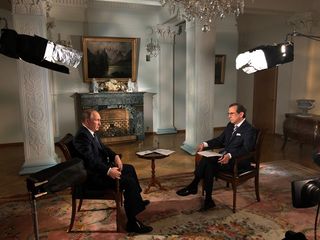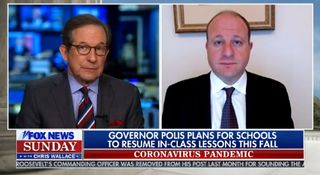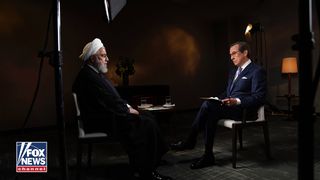Chris Wallace’s Sunday Best
Chris Wallace is the anchor of Fox News Sunday. He joined Fox News Channel in 2003 and is based in Washington. Before joining Fox, Wallace spent 14 years at ABC News. Prior to that, he was chief White House correspondent for NBC News and moderated Meet the Press in 1987 and 1988.
Fox News Sunday is averaging just shy of 5.2 million viewers this year and 1.1 million in the 25-54 demo (across showings on both Fox and Fox News Channel).
The son of famed newsman Mike Wallace, Chris has written Countdown 1945: The Extraordinary Story of the Atomic Bomb and the 116 Days That Changed the World. The book is available June 9.
Wallace spoke with Multichannel News about where the idea for the book came from, how the pandemic compares to other stories he’s covered in his long career, and how the presidential election may shape up. An edited transcript follows.
MCN: In your time in the news business, have you ever seen a story like the pandemic?
Chris Wallace: No. Not only have I never experienced something like this, I never imagined anything like this. I’ve covered wars. We’ve covered 9/11. But the idea of a pandemic — that’s something you read about. The Black Plague, the Flu of 1917. The idea that the country and the world largely shuts down and the economy would come to a crashing halt because of a virus — in this day and age, with all of the biotechnology and all of the science, it never occurred to me this could happen.

I hate it, but I suppose that’s one of the reasons we get into the news business, to cover stories we never imagined. And this is certainly one of them.
Multichannel Newsletter
The smarter way to stay on top of the multichannel video marketplace. Sign up below.
MCN: You’ve been hosting Fox News Sunday from your home. How has that changed the program?
CW: It was awkward the first week or two just because it’s different and I’d never done it that way. But we’re adaptable animals and the thing that surprises me now, in week eight or nine or whatever it is, is how routine it has become.
The only thing I don’t like is, I don’t get to do any of the interviews in person. We often did interviews by satellite because people just aren’t in Washington. I always prefer to do an interview in person. You interact more, you have physical cues in addition to verbal cues, you’re able to connect more with the person. Now, one, it’s satellite, and two, it’s satellite oftentimes with a delay, and that makes it harder.
MCN: Where did the idea for the book come from?
CW: I wanted to do a deep dive on a key moment in American history. Total nonfiction, but almost turn it into a novel in a sense that I was going to take a very precise period of time and delve into the characters, the anecdotes, what they were wearing, almost make it like a novel. All true, absolutely solidly researched, but it would have the feel of an adventure story.
But I didn’t have the idea as to what I wanted to do.
In February 2019, it was the day that Donald Trump was to deliver the State of the Union address. A number of anchors were invited to the White House for lunch, where he’d preview the address. Then four or five of us were invited by Nancy Pelosi to the Hill, where she would do what is called the prebuttal — she was going to say everything that was wrong with the president’s speech before he even delivers it.

We’re in this room in the Capitol, this small, ornate room on the House side. She said, this is the Board of Education. I don’t think most of my colleagues knew what it was but as a student of history, I did. The Board of Education was a secret hideaway. When he was Speaker of the House in the ’40s and ’50s and ’60s, Sam Rayburn — he was from Texas and was known as Mr. Sam — used it as his hideaway. He would invite members of Congress or political cronies to come after hours to sit and have a drink, usually bourbon and branch water, and gossip about politics and discuss strategy.
I was very excited to be in the Board of Education.
[Pelosi] then proceeds to tell a story. She said it was in this room in April of 1945 that Truman, [then] the vice president, got the call that FDR had died. She said Truman talked to the White House, gets the word, hangs up the phone and says, ‘Jesus Christ and General Jackson.’
I thought: ‘I got it! That’s it! That’s the first chapter of the book!’ Harry Truman becomes the president and 116 days later, he drops the bomb on Hiroshima. That was the idea for the book.
It turned out she was slightly wrong. Truman was not told FDR had died. He was told he needed to get to the White House right away. But he did say, ‘Jesus Christ and General Jackson.’
MCN: What are your prime sources for news consumption?
CW: I still read a number of papers every day. The only difference is, I don’t get them physically, which bothers me. One of my joys is to open the front door, walk down the stoop and pick up the newspaper. I don’t do that anymore. I don’t want to have to disinfect it. I do everything online. I’ve become very impressed, and I know this sounds terribly old-fashioned, with how interesting the online editions of newspapers are — there is a lot of additional content. That’s been a discovery for me.
I routinely go online anyway and look at various websites and blogs and newsletters. I watch Fox News. I always watch one evening newscast a night as well, because I’m a big believer in getting your news from multiple sources. People ask me what they should do as a news consumer, and I say, don’t just watch Fox, don’t just read The New York Times. Consume news every day that’s different from your main source and perhaps challenges your preconceptions. That allows you to be a more informed news consumer. It’s almost like a GPS triangulation system where you’re able to see different approaches to the news and figure out what you think is the truth.
MCN: In terms of evening news, is there one you watch or do you rotate?
CW: I like NBC and Lester Holt.
MCN: Tell me about a story you did that made you particularly proud.
CW: I did an extensive interview, a very hard-hitting interview, with [Russian president] Vladimir Putin in July 2018 in Helsinki, right after his summit with President Trump. I was especially proud because I confronted Putin with a lot of questions about meddling in the 2016 election that apparently President Trump didn’t raise. That was a good, serious, tough, news-making interview.
I was also very proud of the interview I did with [former FBI director] James Comey [in December]. It was right after the Inspector General report came out and said the FBI did a very sloppy job getting FISA warrants to surveil Carter Page, who had been a member of the Trump campaign. I think a lot of people in the mainstream media went very easy on Comey. I gave an FBI interrogation to the former head of the FBI.

MCN: Why is Fox News home for you?
CW: I was at ABC in the early 2000s. People used to talk about managing the decline, that the best days of network news were behind them and we were gonna get smaller. Like a lot of newspeople, I had a TV on in my office all day. It’s on mute, but if there’s breaking news I want to see it. When you work at a broadcast network from nine in the morning to 6:30 at night, it has to be on cable. If it’s on a broadcast network, you’ll see game shows or soap operas or talk shows. It seemed, day in and out, cable news was the only place in town.
I was particularly intrigued by Fox News because I thought they did some of the most interesting, inventive, engaging news coverage, particularly in the news hours, as opposed to the opinion hours. Not that I’m against the opinion hours, it just doesn’t interest me as much.
I met with Roger Ailes in spring 2003 and he was a fan of my interviewing style. I was very clear to him. I said ‘Roger, I’m not going to push an agenda, I’m not going to pull my punches. I’m a newsman.’ He said, ‘That’s exactly what I want you to be. Make me one promise — you’ll be as tough on one side as you are on the other. You’re not going to favor one side.’ I said, ‘That’s in my DNA. I’m a contrarian.’
From that day to this one, first under Roger and now Rupert and Lachlan Murdoch, never once have I been second-guessed about a question I asked or a guest I booked. They just want me to play it straight and I have. I feel the complete support of the bosses at Fox News. I find it a great place to work and I’m very proud to be part of it.
MCN: How nasty do you see the election getting?
CW: It’s going to get nasty. Trump is a tough customer. I’ve seen it in the way he treats rivals, I’ve seen it occasionally in the tweets he writes about me. He’s a New York real estate guy and that’s not the easiest, gentlest world to grow up in. So I expect him to be plenty tough.
I don’t know about Biden, but the Democrats just plain don’t like the president. So I expect it to be a very tough, hard-fought and nasty campaign.
Michael Malone, senior content producer at B+C/Multichannel News, covers network programming, including entertainment, news and sports on broadcast, cable and streaming; and local broadcast television. He hosts the podcasts Busted Pilot, about what’s new in television, and Series Business, a chat with the creator of a new program, and writes the column “The Watchman.” He joined B+C in 2005. His journalism has also appeared in The New York Times, The Philadelphia Inquirer, Playboy and New York magazine.

